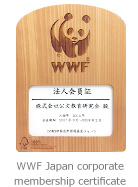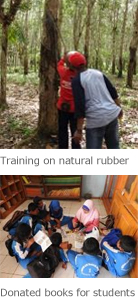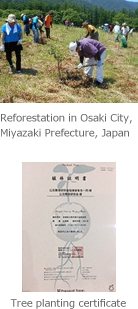Environmental Preservation with External Partners
Kumon Forest Foundation
The Kumon Group has made donations to various environmental organizations. In 2014 we established the Kumon Forest Foundation and built a system to provide our continuous support to these organizations dedicated to environmental preservation.
At the Kumon Group, we use an extremely large volume of paper for creating worksheets, among other purposes. Therefore, we have declared “not to waste paper resources” to be our chief environmental challenge. Kumon staff members have worked as a team to use environmentally friendly paper and to recycle used paper.
From now on, we will also strive for the reduction of our own environmental burden and, by promoting forest resource preservation with external partners through the Kumon Forest Foundation, we will continue to make contributions to the preservation of the global environment and the realization of a sustainable society.
Support for WWF Japan forest preservation activities

Through the Kumon Forest Foundation, the Kumon Group started to give our support to WWF Japan in 2014. WWF Japan is a member of the WWF Network, which is an organization for global environmental preservation operating in over 100 countries worldwide.
The WWF was established in Switzerland in 1961. Its mission is to protect biodiversity around the globe and to reduce the human burden on nature and wildlife. Forest preservation is one of them.
In addition to fieldwork, such as surveying and protecting rare species and reforestation through tree planting, WWF Japan works toward the goal of sustainable forest preservation by supporting local communities and the responsible purchasing of raw materials in Japan. It also conducts promotional and educational activities through the development of environmental educational programs and the organization of seminars and other events related to the environment.
WWF Japan supports forest preservation activities worldwide through its global network and also works on environmental education. Through education, Kumon also aims to make contributions to local communities and countries around the globe. Therefore, since we understand their activities, we also decided to support WWF Japan.
1. Forest preservation in Indonesia
2. Forest preservation in the Russian Far East
Participation in Reforestation Activities through Present Trees
In order to reduce paper usage the Kumon Institute of Education has instituted such policies as having Instructors submit reports via computer rather than paper and order materials and items via computer. We have created a system where Instructors earn Green Points in this way. The Green Points that are earned can be donated to the NPO Environmental Relations for “Present Trees” that are used for reforestation.
In FY2017, we donated to forestation activities in Osaki City, Miyazaki Prefecture, Japan. The planting area is located in the Naruko-onsen Onikobe district near the prefectural border of Yamagata and Akita. This was the area temporarily suspended from accepting cattle due to the Fukushima Daiichi nuclear accident. We planted broadleaf tree seedlings, to make a corner of grassland traces where weeding is no longer done due to a decrease in the demand for grass, again returning it to natural forest.
Together with the Instructors of 16,200 Centers in Japan, KIE will promote the reduction of paper use through Green Point activities and participate in conservation activities for forests through Present Tree.
- Contribution to Developing Countries
- Introduction of Kumon Method study into BRAC schools
in Bangladesh, contribution to achieving SDGs
Kumon's
Environmental
Activities
- Environmental
Management of
the Kumon Group - 2017 Activities and
Environmental Data - Environmental
Communication - Kumon's Environmental
Activities Spreading
throughout the World - Environmental Preservation with External Partners
- Contribution to Developing Countries


